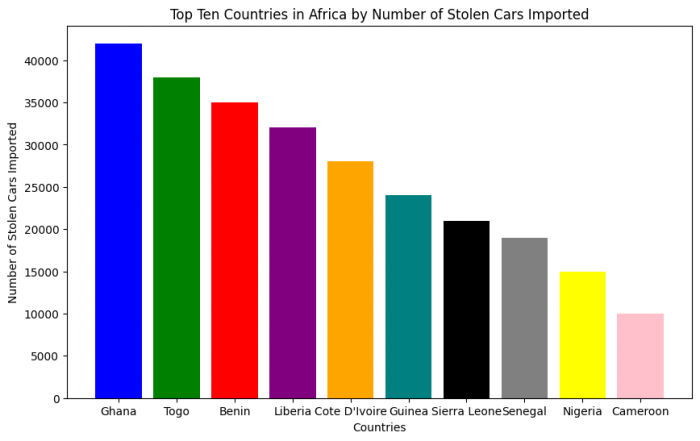Africa faces a significant influx of stolen vehicles, with estimates suggesting over 1 million enter the continent annually. This represents at least 5% of the total used car imports. Shipping costs from Europe to Africa are relatively low, with a container holding one car costing around £1200, while fitting three cars only increases the price to £1800. The weak enforcement and low inspection rates, with less than 2% of containers checked globally, create a major vulnerability.
Apart from the stolen vehicles being imported to Africa, many vehicles are stolen in Africa; due to a lack of proper documentation in most African countries and data discrepancies, it is quite difficult to mention the exact figure of stolen vehicles in Africa.
Hence, this article focuses on the influx of stolen vehicles into Africa and how one can protect themselves from buying a stolen vehicle.
Ghana is a prime destination for stolen vehicles, receiving 80% from Canada and 10% from the USA. Other African nations like Senegal, Kenya, Uganda, and Tanzania are also involved. South Africa stands out as a major source and destination for stolen cars, with a used car import value reaching a staggering $4 billion annually.
The problem is further highlighted by the recovery of multiple stolen cars in Zambia, including one belonging to a former president’s wife. Botswana has also seen a dramatic 76% increase in car thefts, and South Africa is unfortunate to be the second-worst country globally for car crime. These statistics paint a concerning picture of a vast and well-established network for stolen vehicles in Africa.
How Stolen Vehicle Get Into Africa
The table below summarizes regional characteristics and how and from where the stolen vehicle enters Africa; some of these facts are derived from an article published by Dr. Ken German.

Vehicle Theft Data by Region
| Country/Region | Details |
|---|---|
| West Africa |
Ghana: Receives 80% of stolen vehicles from Canada (estimated) and 10% from America. Major receiving ports: Tema (Ghana), Lome (Togo), Cotonou (Benin), Monrovia (Liberia). Routes: Used car markets in Ber (Mali), Burkina Faso, Niger. Other countries: Gambia (known for money laundering), Senegal (known hub for stolen cars from North America and Europe). |
| Central Africa |
Cameroon: Receives stolen vehicles from USA, Europe, Japan, Kuwait, Lebanon, Cyprus, Equatorial Guinea, Gabon. This zone is characterized by unrest, and militia activity disrupts trafficking routes. Equatorial Guinea: High corruption hinders law enforcement. Gabon: Currently under military curfew, but not a major transit point. Central African Republic (CAR): Lack of authority allows theft and hijacking. Chad: Boko Haram activity disrupts trafficking routes. |
| Sahel Region |
Burkina Faso, Cameroon, Chad, Gambia, Guinea, Mauritania, Mali, Niger, Nigeria, Senegal: All involved in trafficking stolen cars. Routes: Algeria, Libya (hazardous due to border closures and rebel activity). Alternative routes: Unguarded entry points in Mauritania. |
| North Africa |
Morocco: Established trafficking route for stolen cars from Europe via Mauritania. Algeria, Tunisia, Libya: Known as "origin" or "transit" countries. Routes: Algeria-Mali/Niger borders, Libya-Chad border (currently closed). Egypt: Thriving stolen vehicle market, supplies Sudan. |
| East Africa |
Sudan: One of the worst for stolen cars, border closures disrupt trafficking. South Sudan: Major demand for vehicles, routes through Uganda and Kenya. Central African Republic (CAR): High demand for vehicles, routes through South Sudan. Ethiopia: Hub for forged documentation and vehicle cloning. Somalia: Not a major destination, some stolen cars come in via Berbera. Kenya: Major hotspot for stolen vehicle imports, routes via Mombasa. Uganda: Major destination for stolen high-value cars, routes via DRC and Kenya. Tanzania: Large influx of stolen cars, initiatives by police reduce theft. |
| Southern Africa |
Malawi, Zambia: Exchange of stolen vehicles occurs at Limpopo River crossing. Zambia: Organized crime groups traffic stolen cars. Zimbabwe: Influx of stolen cars from South Africa. Mozambique: Receives stolen cars from South Africa. South Africa: 2nd worst for car crime globally, major source of stolen vehicles. Namibia: Receives stolen cars from South Africa and UK. Botswana: There is an increase in car theft; some stolen cars are used for irrigation. |
Why it is Important to Run a Theft Check on a Vehicle Before Buying.
Put simply, no one wants to be arrested by a foreign police force for being involved in a stolen vehicle transaction. Can you imagine walking on the streets of Lagos, Accra, or Cape Town and all of a sudden hearing: “FBI, freeze! Your hands where I could see them, now!” Such an embarrassment could be well avoided if you do your due diligence and check if a particular vehicle has been stolen.
Consider the following disastrous consequences associated with buying a used vehicle. Daniel Joseph, a Nigerian man who built a luxurious life, lost 12 years in prison after unknowingly buying a stolen car.
A trusted friend tricked him into the purchase, leading to a legal battle and a harsh sentence. Joseph’s story serves as a warning to verify a vehicle’s history before buying it to avoid similar legal troubles and personal devastation.
A simple theft or Chassis Check can provide detailed vehicle history information and protect buyers and the used car market from unwittingly dealing with stolen property.
Top 10 Disturbing Auto Theft Stats in Africa
| Country | Stats |
|---|---|
| Ghana |
Receives 80% of stolen vehicles from Canada (approx. 100,000 cars) Receives 10% of stolen vehicles from the USA (approx. 100,000 cars) |
| Nigeria | 45% of smuggled vehicles are stolen |
| Senegal | A major hub for stolen cars from North America and Europe |
| Togo & Benin | Increase in black market vehicle traffic |
| Cameroon | Receives stolen vehicles from various countries |
| Kenya | Identified as a hotspot for stolen vehicle imports |
| Uganda | Major destination for high-value stolen cars |
| South Africa | Source of hijacked cars for Zimbabwe and Mozambique |
| Mali | Destination for stolen vehicles from Mauritania and Algeria |
Conclusion
The statistics paint a clear picture: Another form of menace is in cases of carjacking, which is sometimes executed by using stolen automobiles, as Africa remains a hub of such cars with many cars being stolen to be imported into the continent.
Fortunately, this is not an impossible fate that can befall a person because there are things that one can do in a bid to avoid this from happening. Pre-purchase car inspections should be carried out at any time before buying a car, whether from a car trader or from the owner of the car. Of course, legal companies run Chassis Number Check on a car for an affordable charge.
This small light could save you a lot of money, time, and trouble in the future away from the unknowns with just a swipe of your mobile device.





